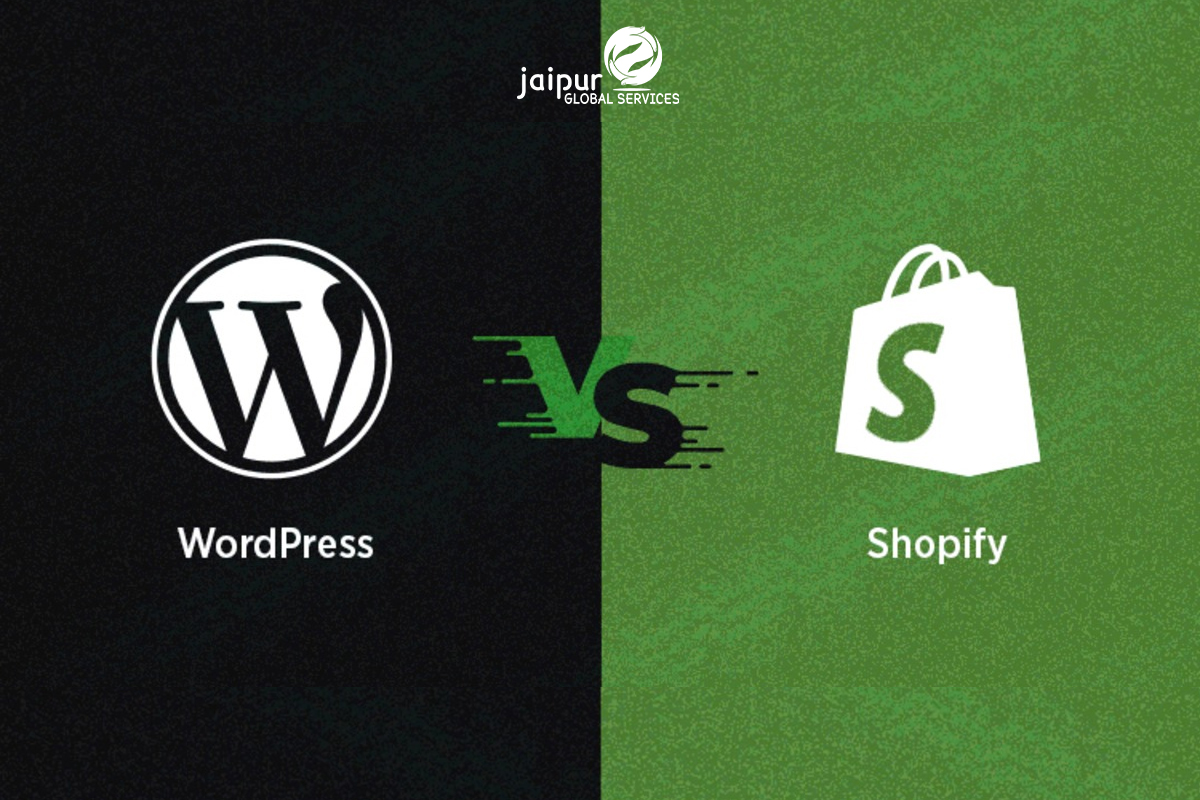
- jgservices
- Apr 21, 2023
- JGS
- 0 Comments
Shopify and WordPress are two of the most popular e-commerce platforms available today. Deciding between Shopify and WordPress can be a challenging task as each platform has its own set of pros and cons. In this article, we will provide an in-depth comparison of the features, ease of use, customization, payment processing, shipping, taxes, and customer support offered by Shopify and WordPress to help you make an informed decision.
Shopify vs. WordPress: Overview
Shopify is an all-in-one e-commerce platform that provides everything you need to create and manage your online store. It is a hosted platform, which means that Shopify hosts your website for you, and you do not need to worry about managing the server or the technical aspects of running a website. Shopify is a popular choice for businesses of all sizes and has over 1 million users worldwide.
WordPress, on the other hand, is a content management system (CMS) that is used by millions of websites around the world. It is an open-source platform, which means that it is free to use and can be customized to meet your specific needs. WordPress is not specifically designed for e-commerce, but it has many e-commerce plugins that allow you to add e-commerce functionality to your website.
Shopify Features
1. Ease of Use: Shopify is designed to be easy to use, and it is ideal for users who do not have any technical expertise. The platform has a drag-and-drop interface that makes it easy to customize your website, and it provides step-by-step instructions to guide you through the setup process.
2. Templates and Customization: Shopify has a large collection of pre-designed templates that you can use to create your website. The templates are customizable, and you can change the color scheme, fonts, and layout to match your brand. Shopify also provides a theme editor that allows you to make changes to the code if you have the technical expertise.
3. Payment Processing: Shopify provides built-in payment processing, and you can accept payments from all major credit cards, PayPal, Apple Pay, and Google Pay. The platform also provides fraud detection and chargeback protection to ensure that your transactions are secure.
4. Shipping and Taxes: Shopify provides shipping and tax calculators that automatically calculate shipping rates and taxes based on your location. You can also set up different shipping rates and tax rates for different regions.
5. Customer Support: Shopify provides 24/7 customer support via phone, email, and live chat. They also have a large community forum where you can find answers to common questions.
WordPress Features
1.Ease of Use: WordPress is easy to use, but it requires a bit more technical expertise than Shopify. You will need to install WordPress on your own server, and you will need to manage the technical aspects of running a website.
2. Templates and Customization: WordPress has thousands of pre-designed templates that you can use to create your e-commerce website. The templates are customizable, and you can use the WordPress theme editor to make changes to the code if you have the technical expertise.
3. Payment Processing: WordPress does not provide built-in payment processing, but there are many e-commerce plugins that you can use to add payment processing to your website. You can use plugins like Woo-Commerce, Easy Digital Downloads, or WP e-Commerce to add payment processing to your website.
4. Shipping and Taxes: Like payment processing, WordPress does not provide built-in shipping and tax calculators. You will need to use plugins like Woo-Commerce or WP e-Commerce to add shipping and tax calculators to your website.
5. Customer Support: WordPress does not provide customer support, but there are many resources available online. There are many community forums, tutorials, and videos available that can help you solve any issues you may encounter.
Cost Comparison
The cost of using Shopify and WordPress depends on the size and complexity of your e-commerce website. Shopify offers several pricing plans both basic plan and advanced plans. Additional fees may apply for payment processing and app integration.
WordPress is free to use, but you will need to pay for web hosting and domain registration. The cost of web hosting varies depending on the hosting provider you choose. Additionally, you may need to purchase premium plugins and themes.
Which platform is better for e-commerce?
Both Shopify and WordPress are powerful e-commerce platforms that offer a range of features to help you create and manage your online store. Shopify is an all-in-one solution that is ideal for users who want a simple and easy-to-use platform. It provides built-in payment processing, shipping and tax calculators, and 24/7 customer support.
WordPress, on the other hand, is a more customizable platform that allows you to add e-commerce functionality to your website using plugins. It requires a bit more technical expertise, but it offers more flexibility and control over your website. However, you will need to manage the technical aspects of running a website, including web hosting and server management.
In the end, selecting either Shopify or WordPress primarily depends on your specific requirements and personal preferences. If you want a simple and easy-to-use platform that provides built-in payment processing and support, Shopify may be the better choice. If you want a more customizable platform that offers more control over your website, WordPress may be the better choice.
Conclusion
In conclusion, both Shopify and WordPress are powerful e-commerce platforms that offer a range of features to help you create and manage your online store. Shopify is ideal for users who want a simple and easy-to-use platform, while WordPress is more customizable and flexible. Ultimately, the choice between Shopify and WordPress comes down to your individual needs and preferences, and you should choose the platform that best suits your ecommerce needs.
